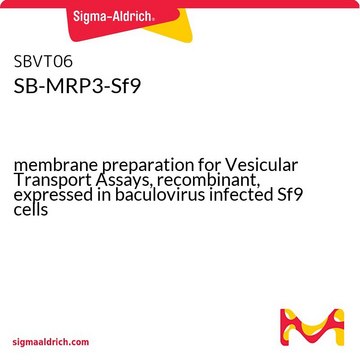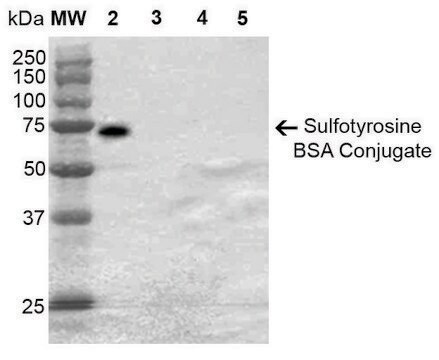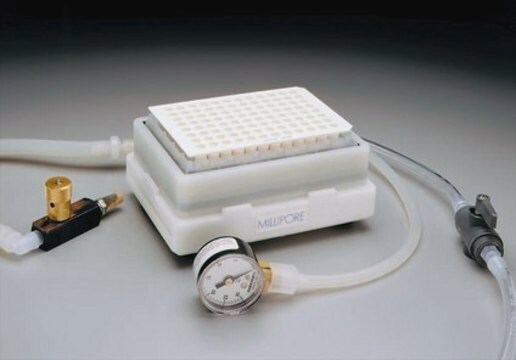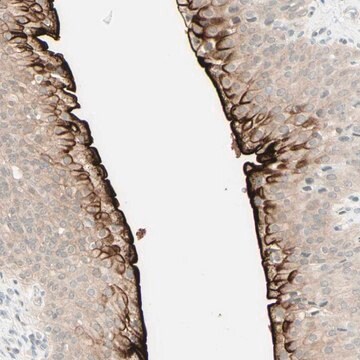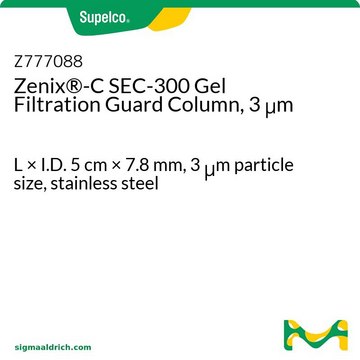추천 제품
재조합
expressed in baculovirus infected Sf9 cells
형태
liquid
농도
5 mg/mL
색상
off-white
UniProt 수납 번호
배송 상태
dry ice
저장 온도
−70°C
유전자 정보
human ... ABCC1(4363)
일반 설명
Membrane Preparations for Vesicular Transport Assays (VT) are suitable for general drug-efflux transporter interaction studies. Both substrate and inhibitor interactions can be assessed using vesicles. The success of substrate interaction studies strongly depends on the passive permeability of the compound. High permeability substrates might not be detected. Control Membranes with no-, or significantly lower transporter activity are also available.
애플리케이션
In the vesicular transport assay so-called "inside-out" membrane vesicles containing ABC transporters are applied. Incubating substrates of the respective efflux transporter in the presence of the inverted membrane vesicles and ATP will allow measuring accumulation of the substrates into the vesicles. In many cases radiolabeled reporter substrates are used but recently SOLVO developed the new PREDIVEZTM Vesicular Transport Kits that use fluorescent reporter substrates.
The standard vesicular transport assay is an inhibitory assay performed with cold test articles. This assay provides information on any interaction between the ABC transporter and the test article. The transport of the reporter substrate is measured in the presence of the test article (typically in 7 concentrations) and IC50 is defined as the concentration inhibiting the transport of the reporter substrate by 50%.
Should radiolabeled form of the investigated compound or adequate analytical methods (LC/MS, HPLC) be available, the vesicular transport assay may be performed in a direct format without the reporter substrate and may identify substrate nature of the test article. The vesicular transport substrate assay is a low throughput assay. It is suitable for low permeability test compounds as high permeability compounds may escape from the vesicles through the lipid bilayer.
PREDIVEZ vesicular transport kit is sold separately. This transporter membrane vesicle assay requires the PREDIVEZ vesicular transport kit and corresponding control membrane below:
SB PREDIVEZ Reagent Kit for MRP1 part number SBPVR2-9RXN and corresponding control membrane SB-beta-gal-Sf9-CTRL part number SBCT03-1EA
The standard vesicular transport assay is an inhibitory assay performed with cold test articles. This assay provides information on any interaction between the ABC transporter and the test article. The transport of the reporter substrate is measured in the presence of the test article (typically in 7 concentrations) and IC50 is defined as the concentration inhibiting the transport of the reporter substrate by 50%.
Should radiolabeled form of the investigated compound or adequate analytical methods (LC/MS, HPLC) be available, the vesicular transport assay may be performed in a direct format without the reporter substrate and may identify substrate nature of the test article. The vesicular transport substrate assay is a low throughput assay. It is suitable for low permeability test compounds as high permeability compounds may escape from the vesicles through the lipid bilayer.
PREDIVEZ vesicular transport kit is sold separately. This transporter membrane vesicle assay requires the PREDIVEZ vesicular transport kit and corresponding control membrane below:
SB PREDIVEZ Reagent Kit for MRP1 part number SBPVR2-9RXN and corresponding control membrane SB-beta-gal-Sf9-CTRL part number SBCT03-1EA
물리적 형태
Supplied as frozen membrane vesicles, containing 5 mg/ml membrane protein, labeled with volume, catalog number (transporter) and date of production.
법적 정보
Distributed for SOLVO Biotechnology, Inc.
Storage Class Code
12 - Non Combustible Liquids
WGK
WGK 1
Flash Point (°F)
Not applicable
Flash Point (°C)
Not applicable
시험 성적서(COA)
제품의 로트/배치 번호를 입력하여 시험 성적서(COA)을 검색하십시오. 로트 및 배치 번호는 제품 라벨에 있는 ‘로트’ 또는 ‘배치’라는 용어 뒤에서 찾을 수 있습니다.
S-M He et al.
Current medicinal chemistry, 18(3), 439-481 (2010-12-15)
Multidrug ABC transporters such as P-glycoprotein (P-gp/MDR1/ABCB1) and multidrug resistance protein 1 (MRP1/ABCC1) play an important role in the extrusion of drugs from the cell and their overexpression can be a cause of failure of anticancer and antimicrobial chemotherapy. Recently
Eva Bakos et al.
Pflugers Archiv : European journal of physiology, 453(5), 621-641 (2006-12-26)
MRP1 (ABCC1) is a peculiar member of the ABC transporter superfamily for several aspects. This protein has an unusually broad substrate specificity and is capable of transporting not only a wide variety of neutral hydrophobic compounds, like the MDR1/P-glycoprotein, but
J H Hooijberg et al.
FEBS letters, 469(1), 47-51 (2000-03-10)
The transport mechanism by which the multidrug resistance protein 1 (MRP1) effluxes cytotoxic agents out of cells is still not completely understood. However, the cellular antioxidant glutathione (GSH) has been shown to have an important role in MRP1-mediated drug transport.
Roger G Deeley et al.
Physiological reviews, 86(3), 849-899 (2006-07-04)
Multidrug Resistance Proteins (MRPs), together with the cystic fibrosis conductance regulator (CFTR/ABCC7) and the sulfonylurea receptors (SUR1/ABCC8 and SUR2/ABCC9) comprise the 13 members of the human "C" branch of the ATP binding cassette (ABC) superfamily. All C branch proteins share
Cornelius F H Mueller et al.
Circulation research, 97(7), 637-644 (2005-08-27)
Glutathione (GSH) is the major source of intracellular sulfhydryl groups. Oxidized GSH (GSSG) can be recycled to GSH by the GSH reductase or exported from the cell. The mechanism by which GSSG is exported and the consequence of its export
자사의 과학자팀은 생명 과학, 재료 과학, 화학 합성, 크로마토그래피, 분석 및 기타 많은 영역을 포함한 모든 과학 분야에 경험이 있습니다..
고객지원팀으로 연락바랍니다.


